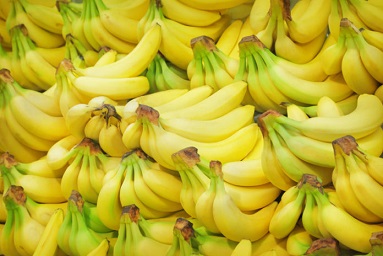BREAKING! Lectins From Bananas Could Serve As An Antiviral Against The SARS-CoV-2 Coronavirus Including Emerging Omicron Sub-lineages!
Source: COVID-19 News - Banana Lectin H84T As A SARS-CoV-2 Antiviral Oct 21, 2022 3 years, 4 months, 3 days, 22 hours, 5 minutes ago
COVID-19 News: A new study conducted by researchers from University of Hong Kong – China, Johannes Kepler University Linz, Linz – Austria and the University of Michigan, Ann Arbor-USA has found that lectins derived from bananas could serve as effective antivirals against the SARS-CoV-2 virus including against the Omicron variant.

As early as 2020, Thailand
Medical News has covered in its
COVID-19 News segments about a study that showed the potential of antivirals made from a lectin called H84T that is derived from bananas was effective against the influenza virus and also certain other coronaviruses.
https://www.thailandmedical.news/news/new-antivirals-produced-from-bananas-able-to-fight-deadly-flu-and-might-also-combat-other-viruses-including-coronaviruses-
The current study team commented, “Pan-coronavirus” antivirals targeting conserved viral components can be designed. Here, we show that the rationally engineered H84T-banana lectin (H84T-BanLec), which specifically recognizes high mannose found on viral proteins but seldom on healthy human cells, potently inhibits Middle East respiratory syndrome coronavirus (MERS-CoV), severe acute respiratory syndrome coronavirus 2 (SARS-CoV-2) (including Omicron variants and sub-lineages), and other human-pathogenic coronaviruses at nanomolar concentrations.”
The study team found that H84T-BanLec protects against MERS-CoV and SARS-CoV-2 infection in vivo.
Furthermore, it was found that intranasally and intraperitoneally administered H84T-BanLec were comparably effective.
Detailed mechanistic assays show that H84T-BanLec targets virus entry. High-speed atomic force microscopy depicts real-time multimolecular associations of H84T-BanLec dimers with the SARS-CoV-2 spike trimer. Single-molecule force spectroscopy demonstrates binding of H84T-BanLec to multiple SARS-CoV-2 spike mannose sites with high affinity and that H84T-BanLec competes with SARS-CoV-2 spike for binding to cellular ACE2. Modeling experiments identify distinct high-mannose glycans in spike recognized by H84T-BanLec.
Importantly, the multiple H84T-BanLec binding sites on spike likely account for the drug compound’s broad-spectrum antiviral activity and the lack of resistant mutants.
The study findings were published in the peer reviewed journal: Cell Reports Medicine.
https://www.cell.com/cell-reports-medicine/fulltext/S2666-3791(22)00329-9
The highlights of the study findings were:
-The banana lectin H84T-BanLec inhibits human-pathogenic coronaviruses through inhibition of viral entry
-H84T-BanLec protects against MERS-CoV and SARS-CoV-2 infections in vivo
-H84T-BanLec binds to multiple SARS-CoV-2 spike high-mannose sites with high affinity
;
The unique mechanism demonstrated by H84T-BanLec likely accounts for its broad-spectrum activity
The study team had prior to the debut of the SARS-CoV-2 virus, been already working on a possible therapy that could be used to fight all known strains of the flu.
When the COVID-19 pandemic was declared, their lab and research was temporarily shut down for a while before the international study team decided to restart their work but instead focus on the coronaviruses especially the MERS, or Middle Eastern Respiratory Syndrome, that caused a brief outbreak in 2015 and resulted in 858 confirmed deaths, and also the new SARS-CoV-2 virus.
Dr David Markovitz, M.D., professor of internal medicine, Division of Infectious Diseases at the University of Michigan Medical School told Thailand
Medical News, "At the time we thought MERS would be the big target, which we were worried about because of its 35% mortality rate."
Their published study is the first to detail the efficacy of H84T-BanLec against all known human-infecting coronaviruses, including MERS, the original SARS, and SARS-CoV2, including the omicron variant.
Besides Dr Markovitz, two other senior researchers of the study include Dr Peter Hinterdorfer, Ph.D., of the Johannes Kepler University Institute of Biophysics, and Dr Kwok-Yung Yuen, MBBS, M.D., of the University of Hong Kong.
Dr Jasper Fuk-Woo Chan, M.D., of the University of Hong Kong is the first author of the study.
Dr Markovitz further added, "When COVID-19 occurred, we of course wanted to study the therapy's potential and discovered it was effective against every type of coronavirus, in vitro and in vivo. Whether delivered systemically or through the nose in animal models, or prophylactically or therapeutically early on in the illness, it worked."
The H84T-BanLec compound is derived from a lectin (a carbohydrate-binding protein) isolated from banana fruit. It accomplishes its remarkable viral-blocking abilities by binding to high-mannose glycans, polysaccharides that are present on the surface of the viruses, but only very rarely on normal healthy human cells. After binding, the virus cannot enter cells to infect them.
Dr Markovitz said that by utilizing atomic force microscopy and related methods, the study team confirmed that H84T develops multiple strong bonds with the spike protein, which probably explains why it's hard for a coronavirus to be resistant to the lectin.
Dr Markovitz also explained that despite their anti-viral potential, lectins have traditionally been avoided as possible therapies because they are proteins that can stimulate the immune system in a potentially harmful way.
But he stressed that in the case of H84T-BanLec however, it has been modified to remove this effect and showed no detrimental effects in the animal models.
Although claims that several treatments for COVID-19 currently exist, including remdesivir, Paxlovid and monoclonal antibodies, they have varied levels of effectiveness, side effects and ease of use and many have proven less effective as SARS-CoV2 continues to evolve.
The banana derived lectin H84T-BanLec holds unique promise, according to the study team, because it is effective against all coronavirus variants as well as influenza viruses.
The study team hopes to see the therapy take the more difficult step from animal model to testing in humans. The study team envisions a nasal spray or drops that can be used to prevent or treat coronavirus and influenza infections in seasonal and pandemic situations.
Interestingly, the study team also hopes to examine using H84T-BanLec against cancer as it has been found that cancer cells, like viruses, also have high mannose glycans on their surfaces.
For the latest
COVID-19 News, keep on logging to Thailand
Medical News.
